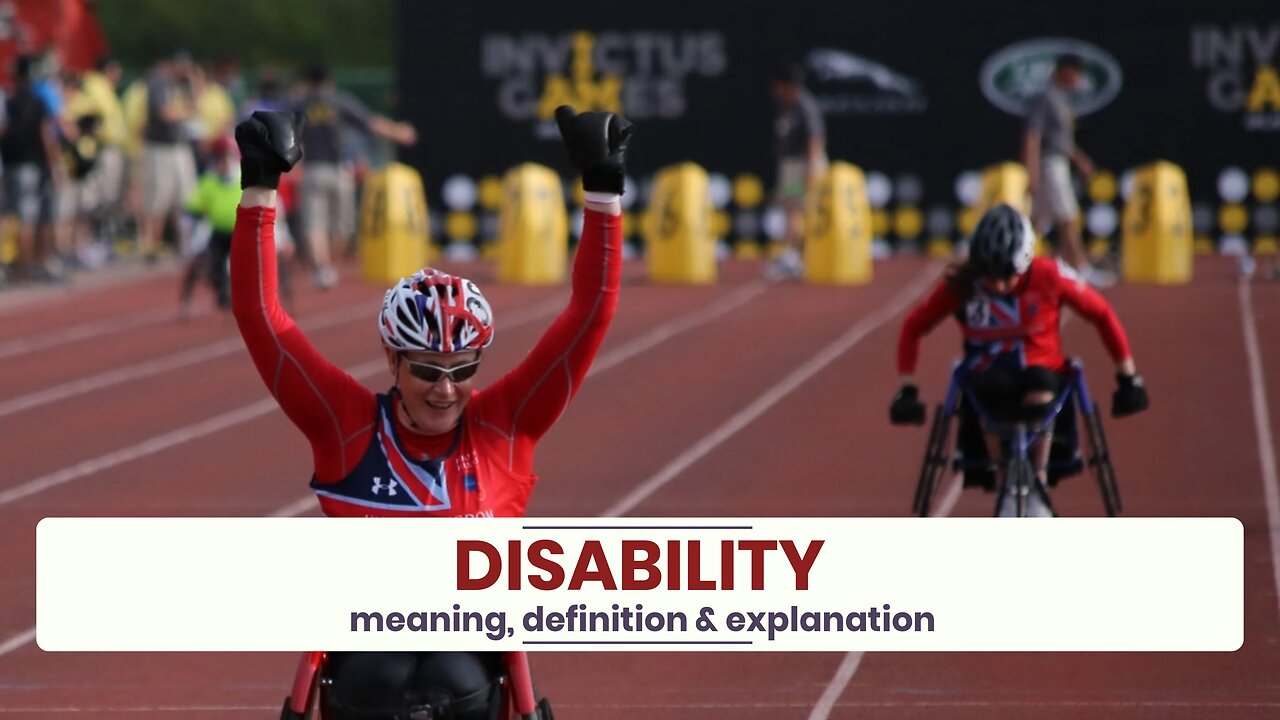Premium Only Content

What is DISABILITY?
✪✪✪✪✪
http://www.theaudiopedia.com
✪✪✪✪✪
What does DISABILITY mean? DISABILITY meaning - DISABILITY definition - DISABILITY explanation. What is the meaning of DISABILITY? What is the definition of DISABILITY? What does DISABILITY stand for? What is DISABILITY meaning? What is DISABILITY definition?
Disability is the consequence of an impairment that may be physical, cognitive, intellectual, mental, sensory, developmental, or some combination of these that results in restrictions on an individual's ability to participate in what is considered "normal" in their everyday society. A disability may be present from birth or occur during a person's lifetime.
Disabilities is an umbrella term, covering impairments, activity limitations, and participation restrictions. An impairment is a problem in body function or structure; an activity limitation is a difficulty encountered by an individual in executing a task or action; while a participation restriction is a problem experienced by an individual in involvement in life situations. Thus, disability is a complex phenomenon, reflecting an interaction between features of a person’s body and features of the society in which he or she lives.
—?World Health Organization, Disabilities
Disability is a contested concept, with different meanings for different communities. On the one hand, it may be used to refer to physical or mental attributes that some institutions, particularly medicine, view as needing to be fixed (the medical model); it may refer to limitations on participation in social life imposed on people by the constraints of an ableist society (the social model); or the term may serve to name a social identity claimed by people with disabilities in order to mark their shared goals and politics.
The contest over disability's definition arose out of disability activism in the U.S. and U.K. in the 1970s, which challenged how medical conceptions of human variation dominated popular discourse about disabilities and how these were reflected in common terminology (e.g., "handicapped," "cripple"). Debates about proper terminology as well as over appropriate models and their implied politics continue in disability communities and the academic field of disability studies. In many countries the law requires that disabilities be clearly categorized and defined in order to assess which citizens qualify for disability benefits.
-
 1:26
1:26
The Audiopedia
8 months agoWhat is MOTTO?
47 -
 LIVE
LIVE
Slightly Offensive
4 hours ago $2.86 earnedCandace REDPILLS the Masses in BOMBSHELL Theo Von Interview | Guest: Shane Cashman
1,362 watching -
 UPCOMING
UPCOMING
DLDAfterDark
25 minutes agoDLD Live! That Sh... Will Get You K***ed! What To Consider in SHTF
-
 LIVE
LIVE
megimu32
3 hours agoON THE SUBJECT: IRL Streamers Attacked & Nostalgic Animal Movies That Made Us Cry
433 watching -
 1:00:54
1:00:54
The Tom Renz Show
7 hours agoMore Epstein/FBI, a Scary Trade War, & the Dem Echo Chamber
7.49K1 -
 40:43
40:43
Kimberly Guilfoyle
8 hours agoDems Double Down on Delusion-Why? Live with Tony Kinnett & Bo French | Ep.202
77.8K35 -
 1:28:42
1:28:42
Redacted News
6 hours agoBREAKING! SOMETHING BIG IS HAPPENING IN EUROPE ALL OUT WAR IS COMING AGAINST RUSSIA, TRUMP FURIOUS
121K286 -
 47:50
47:50
Candace Show Podcast
6 hours agoBREAKING: Judge Makes Statement Regarding Taylor Swift's Text Messages. | Candace Ep 155
113K116 -
 1:14:23
1:14:23
Josh Pate's College Football Show
3 hours ago $0.29 earnedCFB’s Most Hated Teams | FSU & Clemson Future | Big Ten Win Totals | Star Rankings Overrated?
14.5K -
 1:33:47
1:33:47
CatfishedOnline
5 hours agoGoing Live With Robert - Weekly Recap
27.8K